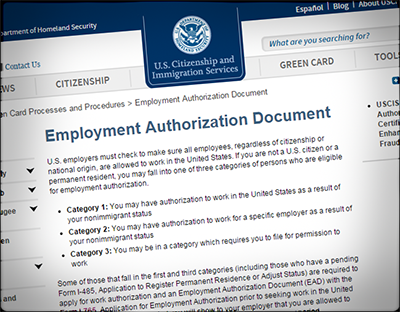USCIS Is Again Temporarily Extending the Validity Periods for Renewable Work Authorization Documents
The U.S. Department of Homeland Security (DHS) issued a rule on April 8, 2024, to temporarily amend existing regulations to increase the automatic extension period applicable to expiring Employment Authorization Documents (EADs or Form I-765) for certain renewal applicants from up to 180 days to up to 540 days from their expiration date. DHS says that it has issued this TFR to help “prevent renewal applicants from experiencing a lapse in their employment authorization and documentation” because of long U.S. Citizenship and Immigration Services (USCIS) processing times. USCIS is the component of DHS that adjudicates most immigration benefit requests, including EAD applications.
DHS estimates that approximately 800,000 EAD renewal applicants will be in danger of having their work authorization lapse while their applications remain pending beyond the existing 180-day automatic extension period. The agency also clarified that such wide-scale lapses in employment authorization and EAD validity would occur because of no fault of the applicants, but rather as a result of on-going USCIS processing delays.
This is the second time the Biden administration has issued a temporary rule to extend the validity period of renewable EADs to address this issue. This policy change also follows USCIS’s 2023 decision to increase the maximum validity period of initial and renewal EADs to five years (from typically two years) for certain aliens, including refugees and asylees, asylum applicants, and withholding of removal recipients.
Who Can Benefit from the 540-Day Automatic Extension?
Any eligible renewal EAD applicant with an application filed on or after October 27, 2023, and pending on or after April 8, 2024, will be able to benefit from the automatic extension period increase. Additionally, any eligible applicant who files a renewal EAD application during the 540-day period beginning on or after April 8, 2024, until September 30, 2025. Applicants must also meet these eligibility requirements:
- The renewal applicant files an application to renew the employment authorization and/or EAD in a timely manner before the EAD expires;
- The renewal EAD application is based on the same employment authorization category on the front of the expiring EAD or is for an individual approved for Temporary Protected Status (TPS) whose EAD was issued pursuant to 8 CFR 274a.12(c)(19); and
- The renewal applicant’s eligibility to apply for employment authorization continues notwithstanding the expiration of the EAD and is based on an employment authorization category that does not require the adjudication of an underlying application or petition before the adjudication of the renewal application, as may be announced on the USCIS website.
Finally, the automatic extension is limited to: asylum applicants and grantees; refugees; parents or dependent children of lawful permanent residents (green card holders); aliens who have applied for and aliens who have been granted withholding of removal; certain TPS applicants; TPS recipients; spouses of E-1/2/3 nonimmigrant visa holders; spouses of L-1 nonimmigrant visa holders; certain aliens who have filed lawful permanent resident (green card) applications; aliens who have filed applications for suspension of deportation, cancellation of removal, or special rule cancellation of removal; aliens who have filed applications for creation of record of lawful admission for permanent residence; aliens who have filed applications to legalize under section 210 or 245A of the Immigration and Nationality Act (INA); certain alien spouses of H-1B nonimmigrant visa holders; and aliens who are the principal beneficiaries or derivative children of approved Violence Against Women Act VAWA self-petitioners.
Why Do USCIS Processing Times Continue to Grow?
The Biden administration’s border policies, historic expansion of TPS, and abuse of parole play a significant role in stunting the agency’s ability to manage its workload. While USCIS has taken measures to address processing times, such as developing and opening the Humanitarian, Adjustment, Removing Conditions, and Travel Documents (HART) Service Center, the “majority of [USCIS’s] actions address only the symptoms and not the root causes of backlogs themselves”, reported the USCIS Ombudsman to Congress in its 2023 annual report.
The Biden administration’s expansion of work authorization eligibility to hundreds of thousands of aliens who are inadmissible to the United States on an annual basis has kept processing times historically high, even while USCIS has reassigned officers to address priority workloads and worked “diligently” to hire more staff. In its automatic EAD extension announcement, DHS reported a significant spike in the number of EAD applications received by USCIS in 2023. Compared to 2022, USCIS experienced a 77 percent increase in applications as compared to 2022.
As of February 2024, the total number of pending EAD applications stood at approximately 1.4 million applications, which “continues to pose a challenge for USCIS and also impacts processing times for renewal EAD applications eligible for automatic extensions because of the limited amount of USCIS resources that can be allocated to those case types”. DHS concedes that the primary drivers in the growth of EAD applications in FY 2023 (both initials and renewals) were EAD applications based on pending asylum applications, TPS, and parole.
Since 2021, the Biden administration has created at least eight new parole programs and expanded at least three existing parole programs to facilitate the entry of inadmissible aliens into the United States. These programs allow inadmissible aliens to enter, remain, and work in the United States for periods of at least two years, and include the Central American Minors program and parole programs specifically designed for nationals of Afghanistan, Colombia, Cuba, El Salvador, Guatemala, Haiti, Honduras, Nicaragua, Venezuela, and Ukraine.
Moreover, while officials from the USCIS Asylum Division have attributed the administration’s expansive use of prosecutorial discretion (under what is referred to as the “Doyle Memo”) to cancel large numbers of cases in immigration court as a significant factor in the increase of affirmative asylum filings, the USCIS Ombudsman specifically highlighted the Biden administration’s expansive use of parole as a factor. The Ombudsman explained that the creation of the Biden administration’s parole programs has resulted in higher volumes of affirmative asylum filings and concluded that the USCIS Asylum Division “does not have the capacity for additional prioritization of asylum applications filed by all noncitizens paroled into the United States” under these new programs.
The USCIS Ombudsman’s report also emphasized the “increased demand” for TPS as a significant challenge for USCIS, stating, “Processing work authorization for these populations in itself is a never-ending task for the agency.” The USCIS Ombudsman noted that this growing population means “that the agency carries a larger and more complex workload with each new designation or extension”.
The Biden administration has expanded the TPS population to historic levels by extending or re-designating TPS for every country that had current designations at the time President Biden took office, as well as by designating new countries for TPS. The office, however, failed to identify this demand as a creation of the Biden administration’s own making, and instead opted to refer to this expansion as an “event outside the agency’s control”. The Pew Research Center estimates that nearly 1.2 million aliens living in the United States are either receiving or eligible for TPS.
In FY 2023, USCIS received an average of approximately 52,800 automatic-extension-eligible EAD applications per month, but currently only completes approximately 49,100 of such requests per month. Of those 1.4 million pending cases, the total number of pending EAD renewal applications that are subject to automatic renewal regulations was reported to as approximately 439,000.
Public Comment Opportunity
DHS is accepting comments from the public on all aspects of the TFR, but specifically invites the public to comment on:
- Whether DHS regulations should be revised to permanently lengthen the period of the automatic extension period to up to 540 days for employment authorization and/or EAD validity for eligible renewal applicants;
- Whether a different or permanent extension period should be implemented, for some or all of the applicants covered by the automatic extension provision on either a temporary or permanent basis; and
- Whether other solutions should be considered to mitigate the risk of expiring employment authorization and/or EAD validity for some or all applicants covered by the automatic extension provision.
Comments must be submitted before midnight Eastern time on June 7, 2024.






